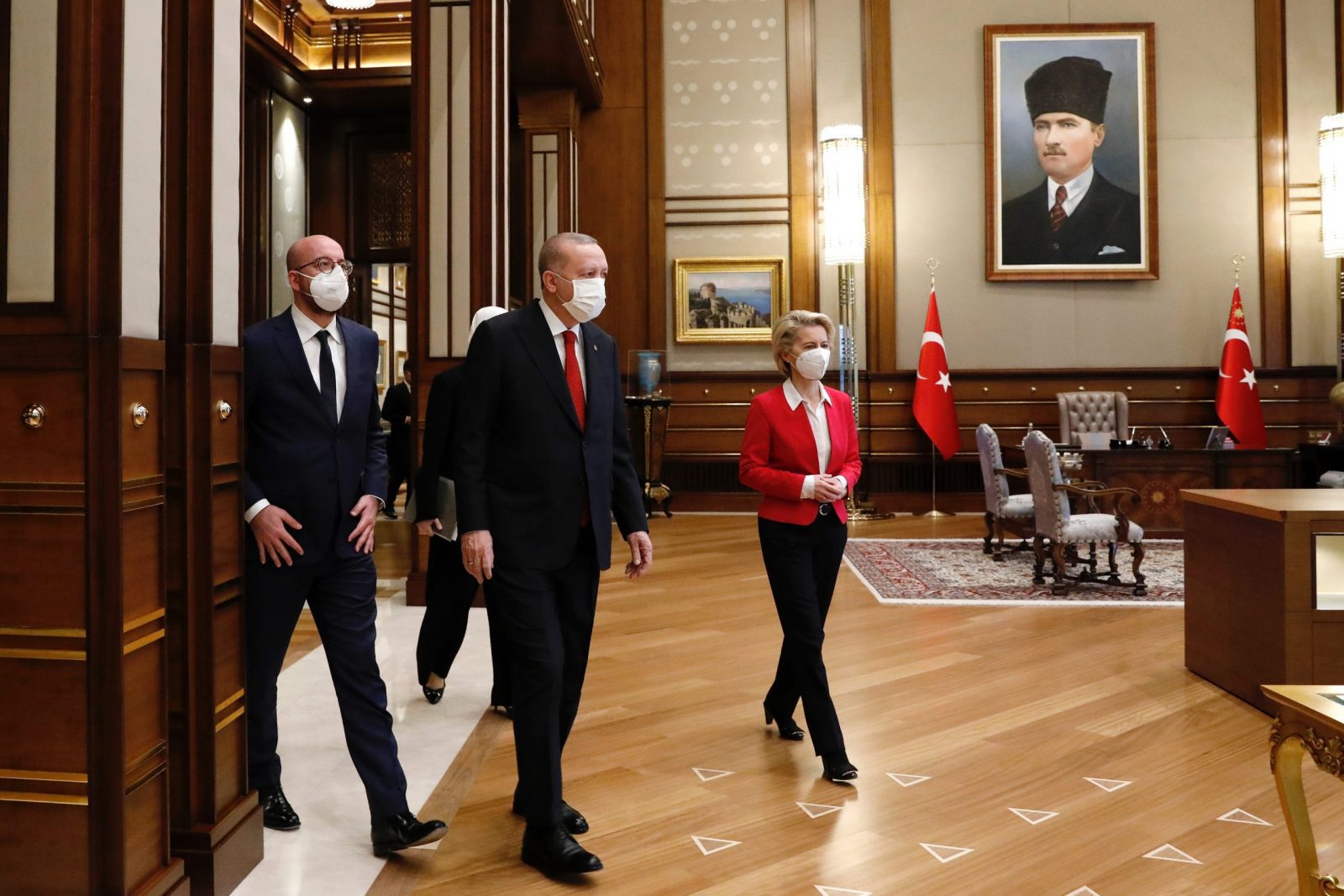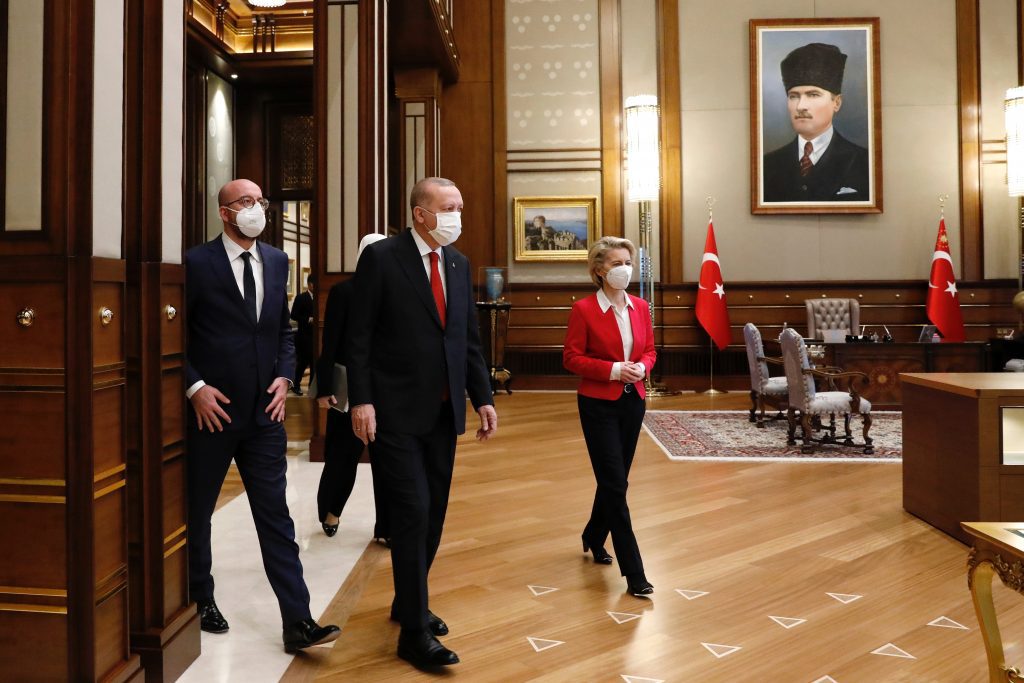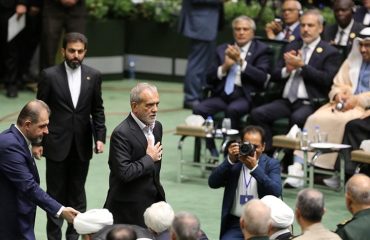

The protocol accident European Commission President Ursula von der Leyen experienced and the statements released afterwards once again revealed the mood that prevailed in EU-Turkey relations. Instead of working to realize the enormous potential of unity and cooperation between these two parties, to strengthen the liberal democracy front in the world by becoming one of the few power blocks in the near future, and to contribute enormously to world peace and tranquility, wasting even the slightest opportunity of advancement along this path with personal conflicts and protocol crises… It is this lack of vision, an inconsistency that puts interests before principles and double standards, which dominate the EU – Turkey relations.
Diplomatic protocol, social courtesy
In the tradition of the “God’s Guest” of the Turks, it is believed that the guest is sent by God and is the messenger of good and beautiful things; therefore, the guest is seated in the seat of honor. In international relations, the principle of equality between host and visiting diplomats applies; same-level state representatives stand and sit at the same level.
The European Commission presided by Ursula von der Leyen and the European Council headed by Charles Michel, who are the President of the Republic of Turkey’s interlocutors in the EU, are considered equivalent in diplomacy and have been treated so in the past. The reason for this is that there is equivalence between these two institutions of the EU, which have a political structure between independent states and have not yet become a state.
It appears that there is a personal conflict between Charles Michel and Ursula von der Leyen, which is reflected in normal EU affairs and sometimes gets ahead of their duties. It is obvious that, during their joint visit to Ankara, the two came to meeting without determining the protocol between them and who would stand where. It is understood that the Presidency of the Republic of Turkey protocol officials did not pay attention to this conflict and did not take measures to prevent the protocol crisis. As a result, it was not gentlemanlike for the males to sit on the head seats while the female one of the 3 people who were equal to each other was left standing.
I condemn the protocol officials of the Turkish Presidency for this protocol shame they failed to prevent. Even if this action was made to counter a protocol shame that had been against Turkey in the past, such mistake that does not fit into our cultural values cannot be tolerated.
What should be condemned in this case is that although his colleague and equal, Ursula von der Leyen, remained standing, Charles Michel sitting on the seat immediately, and even after realizing this situation, settling in the seat more with the “I sat down first” attitude. This behavior is both diplomatically inappropriate and also deserves criticism in line with the rules of courtesy since it was committed against a woman.
Practice what you preach
The main problem is that prejudiced Europeans want to pin the diplomatic protocol problem among their representatives on Turkey, and they imply that the Presidency of the Republic of Turkey humiliated Ms. Von der Leyen as both a diplomat and a woman. Mario Draghi, to whom we can advise “practice what you preach”, disregarding that the personal conflict between the top representatives of the EU is reflected in diplomacy and describing Mr. Erdoğan as a “dictator” is a tangible example of this prejudice.
The root cause of the problems caused by the protocol accident is; the “hypocrisy”, which can be translated into Turkish as “double standard”, and the EU dynamics that put interests ahead of values and principles while they seem to defend values…
Like “Where there’s smoke, there’s fire”, this crisis, which prevents diplomats from doing their normal work, is a natural consequence of the EU dynamics that are always causing problems and will continue to do so, far from a far-sighted vision, narrow-minded and focused on short-term interests.
These dynamics would result as a crisis of something else, had it not been for this protocol crisis. Wasn’t it the issue of the extradition of two Greek soldiers who crossed the border without permission, which caused the Varna summit that we hoped for positive developments not to make any progress?
Equality between sovereign states?
The first of the problems caused by the contradictory internal dynamics of the EU in relations with Turkey is the equality problem between the two sovereign powers, the problem that the EU does not see Turkey as an interlocutor who has equal rights and should be treated with justice. EU from the perspective of Turkey and average Turkish citizens is perceived as a power that sees itself as a richer and stronger big brother while seeing Turkey as a weak, poor and needy little brother and waits for Turkey to accept this role; who is an unjust brother that uses its wealth and power not to establish a principles-based, just international order, but willing to take on more and better, and hold others responsible for the negativities it causes without even self-criticism.
Indeed, despite the fact that Turkey is an international problem that awaits a solution under the undertaking of Britain and Greece, isn’t it the EU that made Cyprus a full member of the EU and made the progress of relations impossible? Wasn’t it the EU who tried to keep Turkey, with almost half of its total borders surrounded by the Aegean Islands Sea and the Mediterranean, with a land area equal to the sum of Germany and France, and a population of 83 million close to one third of the EU, away from the Eastern Mediterranean and international waters by using the walnut-sized island of Castellorizo as an excuse?
EU contradicts with its principles
Secondly, and in my opinion, the basis of all problems is the EU’s interest-oriented behavior that contradicts the principles advocated by itself, i.e. historical hypocrisy.
Although strongly criticizing Turkey for problems of rule of law, judicial independence and democracy, why did the EU open up economic chapters with priority in which its interests are far ahead when it comes to full membership negotiations? How can it be explained that the issues where the most severe criticisms are raised are in the 23rd and 24th chapters within the membership negotiations? Isn’t the attitude of the EU, which has such an approach, to say “let’s get to our interests first, then we will come to the rule of law and democracy issues”?
Why does the EU, which does not even bring a self-criticism to the problems of judicial independence (hence democracy) in France, Italy, Romania and Slovakia and the politicization of the judiciary in Germany and Spain, and the legitimacy of the judiciary throughout the EU, with the exception of a few small countries, unable to create and propose a judicial model that works efficiently, effectively accountable and defends its independence, criticize the candidate and new member countries in judicial matters? Has the EU evaluated how much it contributed to the growth of judicial problems in Romania and Slovakia? How much does the EU know when it comes to the legitimacy issues, which are the root causes of the judiciary and democracy problems in Poland and Hungary trying to transition from socialist state structure to liberal democracy?
Isn’t EU’s not initiating sincere and healthy full membership negotiations with Turkey, refraining from updating the Customs Union agreement, which was signed with a full membership perspective, against Turkey and which is already out of date, an example of its interest-driven approach?
How can the EU, which we wish to be instrumental in the development of democracy, rule of law and fundamental human rights in Turkey, which watched the sinking of the boats of immigrants in the Mediterranean and the conflicts in Syria, Iraq, Yemen, Palestine, and North Africa, explain the contradiction in its unfair maneuvers to partner with the rich hydrocarbon resources in the Eastern Mediterranean?
The EU can tame and eradicate this root cause that caused human civilization to suffer twice the great destruction by developing a very far-sighted vision that sees 100-200 years ahead. The collapse of European civilization poses the danger of the collapse of all human civilization this time. For this, the EU should stop putting the interests first while seeming to defend the principles and should defend the same values and adopt the principles in unity and internationally.
Who will believe in the sincerity of the EU, which has declared that it emphasizes the social equality of women and the Istanbul Convention on this issue in negotiations with Turkey in the face of the impudence of its highest representative towards Ms. Ursula von der Leyen?


